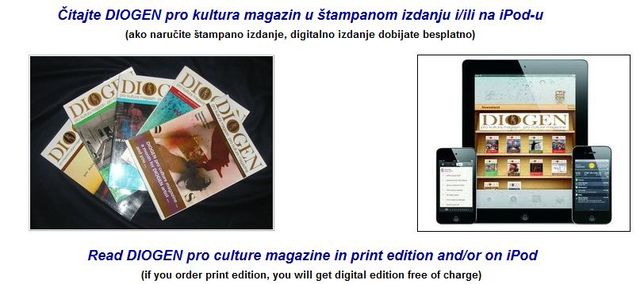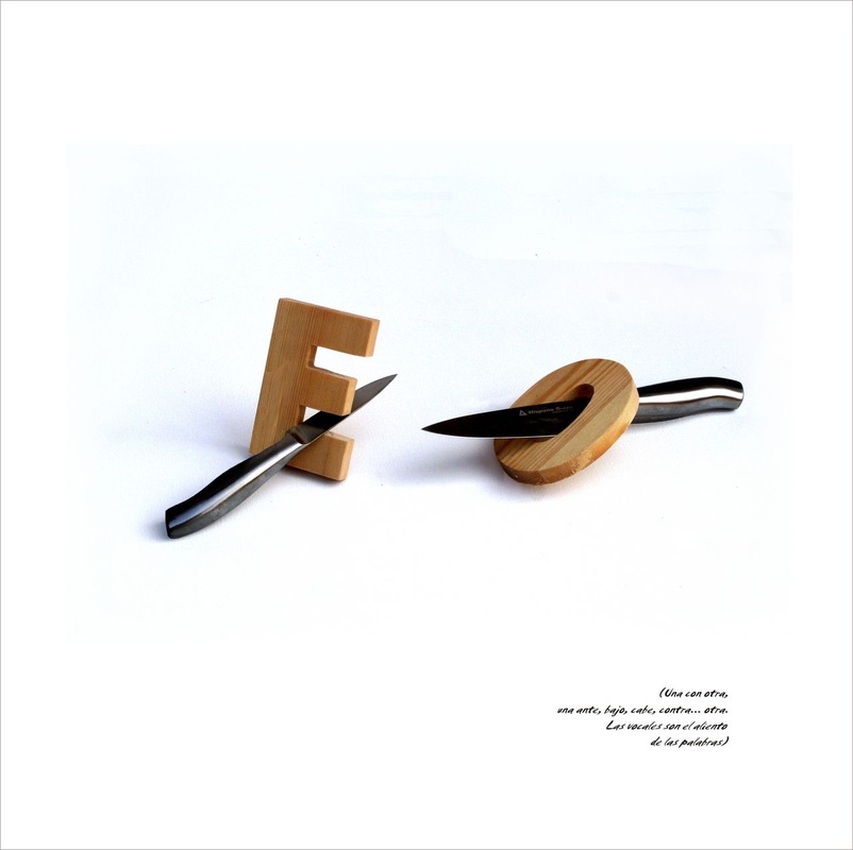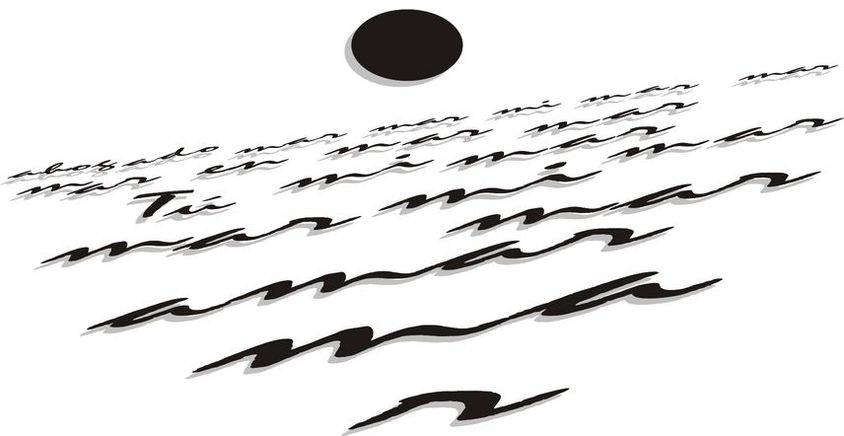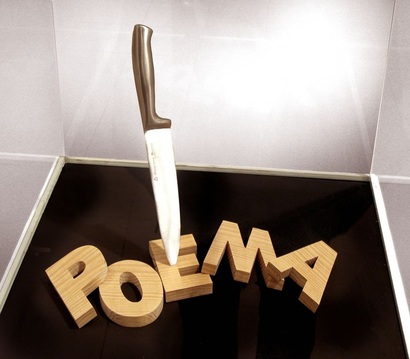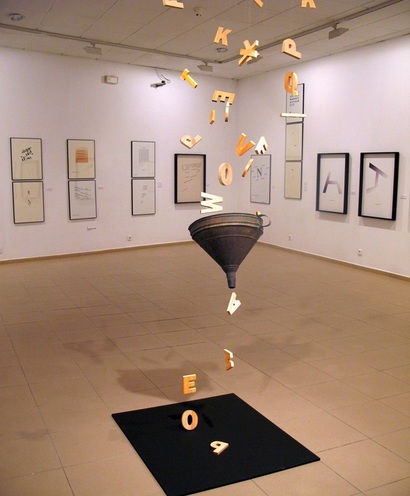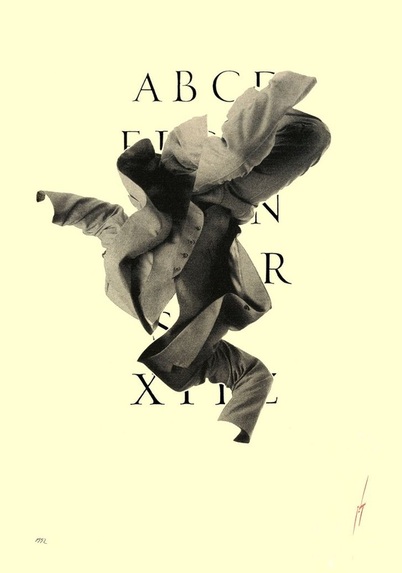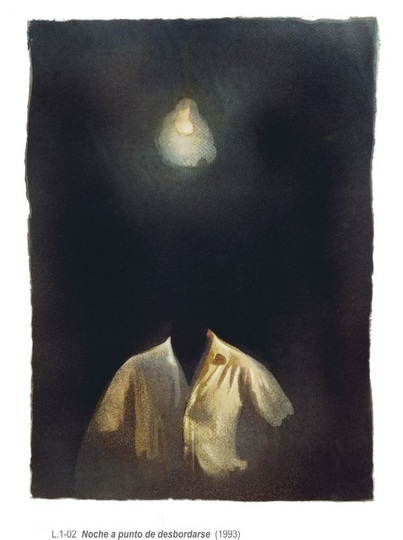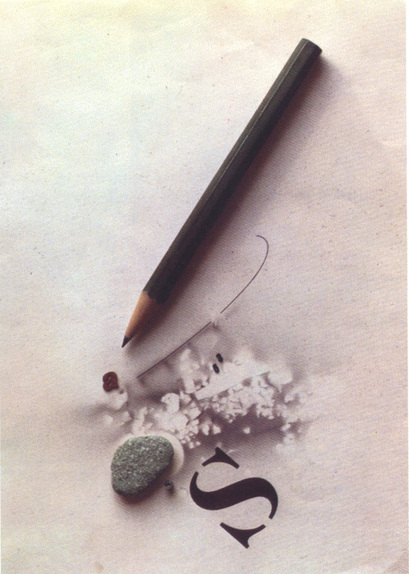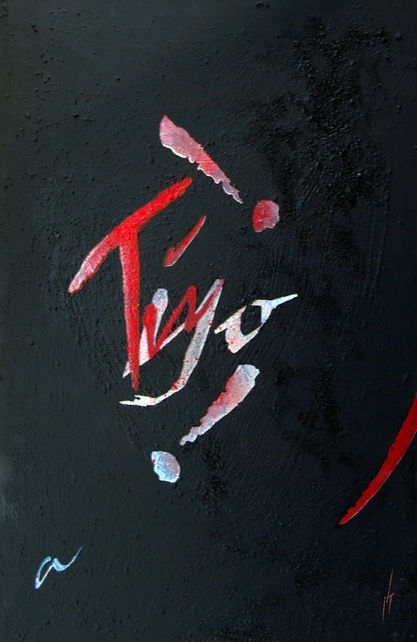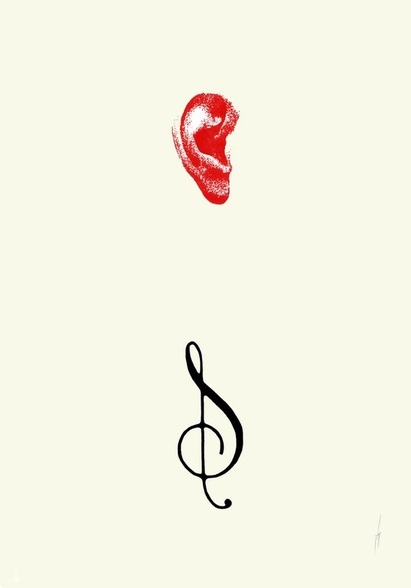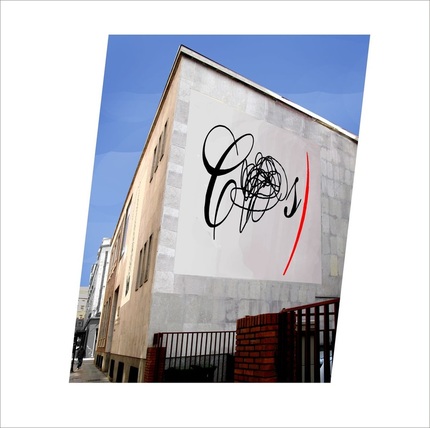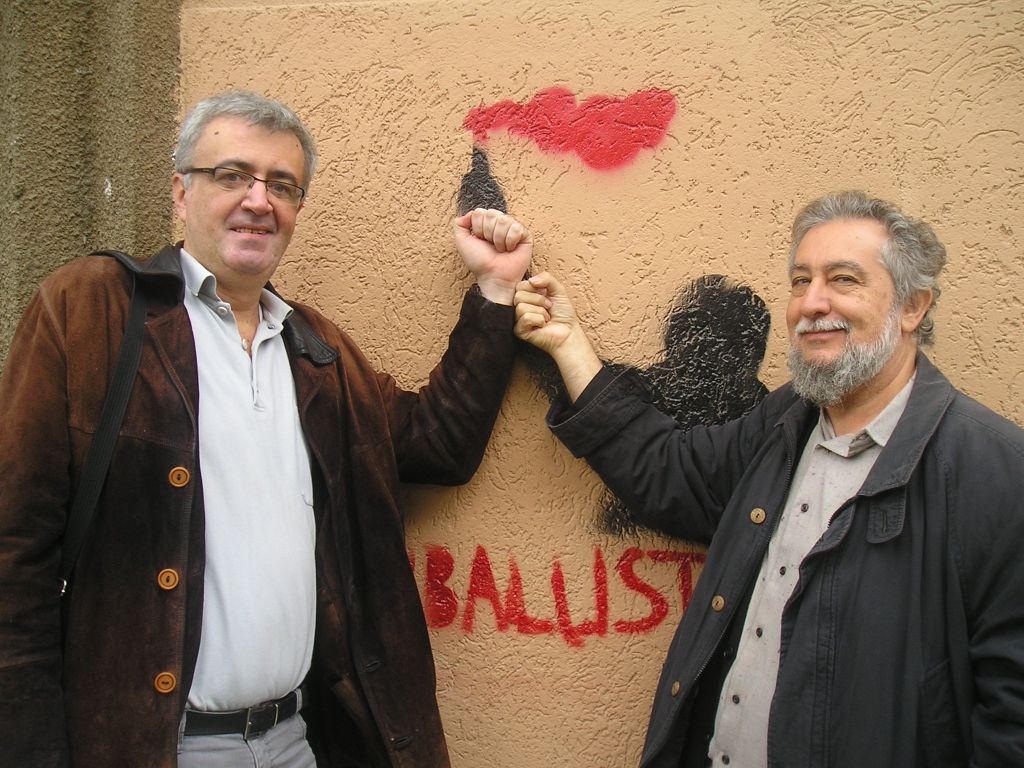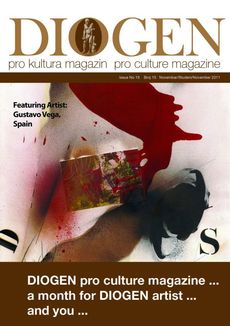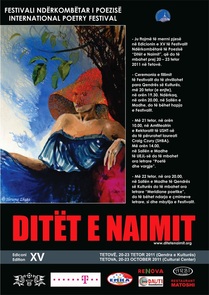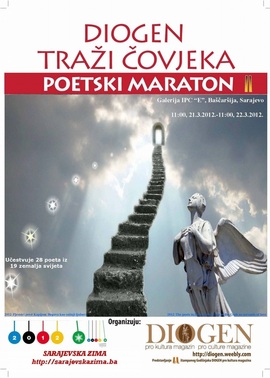|
NA LISTI Od 04.8.2010.g. /
LISTED SINCE August 4th, 2010 among leading European magazines: |
All Rights Reserved
Publisher online and owner: Sabahudin Hadžialić, MSc Sarajevo & Bugojno, Bosnia and Herzegovina MI OBJEDINJUJEMO RAZLIČITOSTI... WE ARE UNIFYING DIVERSITIES |
Gustavo Vega, Barcelona, Spain
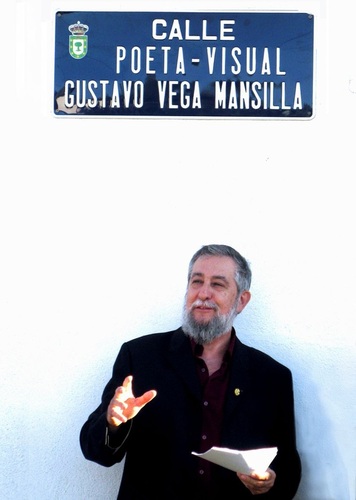
Biography in Spanish language:
Leonés, 1948, residente en Barcelona, es profesor, poeta (visual), artista y escritor.
Es Dr. en Filología Hispánica y Literatura, Universidad de Barcelona; Lic. en Filosofía, Universitas S.Thoma Aq. In Urbe, Roma; Lic. en Filosofía y Letras (espec. Filosofía), Universidad de Barcelona; y Titulado en Magisterio, León.
Su Tesis Doctoral: Poéticas de Creación Visual en España, 1970-1995 obtuvo la máxima distinción: Sobresaliente Cum Laude; y Premio Extraordinario, Universidad de. Barcelona.
En su obra coincide la FILOSOFÍA con la CREACIÓN POÉTICA -poesía textual, visual, fonética, acción…- y la IMAGEN VISUAL -plástica y nuevas tecnologías, multimedia- lo que se sintetiza en obras de carácter interdisciplinar: POESÍA VISUAL principalmente. Consistes sus actividades en investigación teórica, práctica creativa, docencia y divulgación.
Ha sido PROFESOR en la Universidad de León ("Palabra e Imagen. Poesía Visual" ), BCA, Universidad de Barcelona ("Historia del Arte y de la Cultura en España") y en el Col-legi Casp, Barcelona ("Filosofía", "Historia de la Filosofía", "Infografía. Poesía Visual" ...)y ha realizado Talleres de Creación Poética -textual, visual, fonética, de acción...- en diferentes instituciones de España y Argentina.
Ha publicado libros de creación (PoÉticas Visuales, Prólogo para un Silencio, El Placer de Ser, Habitando Transparencias, La Frontera del Infinito y otros), carpetas, plaquettes, vídeos, CD, DVD etc. Ha sido incluido en antologías, multitud de revistas, web, etc.Ha publicado. Ha realizadoExposiciones (30 individuales y participado en 2 centenares de colectivas); así como Conferencias y Recitales en España y extranjero– Argentina, Francia, Italia, Inglaterra, Uruguay...-
La calle donde nació hoy lleva su nombre: Calle Poeta Visual Gustavo Vega Mansilla y tanto él como sus Talleres de Creación Poética han recibido becas y premios en diferentes ocasiones. De su obra se han hecho eco antologías, estudios y universidades.
(Más información: http://www.gustavovega.com)
------------------------------------------
Biography in English language:
Gustavo Vega born in León, Spain, in 1948, is Dr in Spanish Philology from the University of Barcelona, graduated in Philosophy from University of Saint Thomas Aquinas in Rome, Philosophy and Arts (spec. Philosophy) from the University of Barcelona and Teaching from the University of León. PhD thesis: Poéticas de Creación Visual en España, 1970-1995 (Poetics of visual creation in Spain, 1970-1995).
Will talk about the plurality of his visual poetry: ideographic,
calligraphic, letrist, concrete, spatial, video poetry, three dimensional
poems--object-poems or sculpture-poems, installation-poems, action-poems,
etc.
Vega, one of the main practitioners of visual poetry in Spain, was born in León, but has resided in Barcelona since 1972. He specializes in theoretical investigation, pedagogy and creative activity in three fields: philosophy, poetry and the plastic arts. Three disciplines which Vega combines and frequently synthesizes in his works, obtaining a perfect ensemble of literary-poetic elements and plastic arts. As a plastic artist and visual poet, he has exhibited individually in Spain, Argentina… and participated in more than one hundred group exhibitions.
Vega is the author of Habitando Transparencias (Inhabiting Transparencies) (Barcelona: Àmbito Literario, 1982), El Placer de ser (The Pleasure of Being) (Madrid: Ed. Endymion, 1997), Prólogo para un Silencio (Prologue for a Silence) (Barcelona: Ed. Zendrera Zariquiey, 2001), La Frontera del Infinito (The Border of the Infinite) (León: Colec. Palabra & Imagen, University of León, 2005), Plaça del Bonsuccés (Plaza del BuenSuceso) - Talleres de Creación Poética en Barcelona- (Poetry Workshops in Barcelona) Madrid: Ed. Libertarias, 1994), and many folios of visual and interdisciplinary poetry: Al límite del instante, (At the Edge of the Moment), Teoría-81 (Theory-81), 3x3-3, etc. He
founded and directs the group Ex.Tensión Fonética and the Laboratorio de Investigaciones Poético-Fonéticas (Laboratory for Poetic-Phonetic Investigation), which has presented many recitals in the Catalonian region. As part of his pedagogical activity he has given creative poetry seminars, courses and workshops in both Spain and Latin America. For a number of years he has taught courses in Art History at the University of Barcelona, as well as visual poetry at the University of León and in other institutions.
http://www.gustavovega.com
Leonés, 1948, residente en Barcelona, es profesor, poeta (visual), artista y escritor.
Es Dr. en Filología Hispánica y Literatura, Universidad de Barcelona; Lic. en Filosofía, Universitas S.Thoma Aq. In Urbe, Roma; Lic. en Filosofía y Letras (espec. Filosofía), Universidad de Barcelona; y Titulado en Magisterio, León.
Su Tesis Doctoral: Poéticas de Creación Visual en España, 1970-1995 obtuvo la máxima distinción: Sobresaliente Cum Laude; y Premio Extraordinario, Universidad de. Barcelona.
En su obra coincide la FILOSOFÍA con la CREACIÓN POÉTICA -poesía textual, visual, fonética, acción…- y la IMAGEN VISUAL -plástica y nuevas tecnologías, multimedia- lo que se sintetiza en obras de carácter interdisciplinar: POESÍA VISUAL principalmente. Consistes sus actividades en investigación teórica, práctica creativa, docencia y divulgación.
Ha sido PROFESOR en la Universidad de León ("Palabra e Imagen. Poesía Visual" ), BCA, Universidad de Barcelona ("Historia del Arte y de la Cultura en España") y en el Col-legi Casp, Barcelona ("Filosofía", "Historia de la Filosofía", "Infografía. Poesía Visual" ...)y ha realizado Talleres de Creación Poética -textual, visual, fonética, de acción...- en diferentes instituciones de España y Argentina.
Ha publicado libros de creación (PoÉticas Visuales, Prólogo para un Silencio, El Placer de Ser, Habitando Transparencias, La Frontera del Infinito y otros), carpetas, plaquettes, vídeos, CD, DVD etc. Ha sido incluido en antologías, multitud de revistas, web, etc.Ha publicado. Ha realizadoExposiciones (30 individuales y participado en 2 centenares de colectivas); así como Conferencias y Recitales en España y extranjero– Argentina, Francia, Italia, Inglaterra, Uruguay...-
La calle donde nació hoy lleva su nombre: Calle Poeta Visual Gustavo Vega Mansilla y tanto él como sus Talleres de Creación Poética han recibido becas y premios en diferentes ocasiones. De su obra se han hecho eco antologías, estudios y universidades.
(Más información: http://www.gustavovega.com)
------------------------------------------
Biography in English language:
Gustavo Vega born in León, Spain, in 1948, is Dr in Spanish Philology from the University of Barcelona, graduated in Philosophy from University of Saint Thomas Aquinas in Rome, Philosophy and Arts (spec. Philosophy) from the University of Barcelona and Teaching from the University of León. PhD thesis: Poéticas de Creación Visual en España, 1970-1995 (Poetics of visual creation in Spain, 1970-1995).
Will talk about the plurality of his visual poetry: ideographic,
calligraphic, letrist, concrete, spatial, video poetry, three dimensional
poems--object-poems or sculpture-poems, installation-poems, action-poems,
etc.
Vega, one of the main practitioners of visual poetry in Spain, was born in León, but has resided in Barcelona since 1972. He specializes in theoretical investigation, pedagogy and creative activity in three fields: philosophy, poetry and the plastic arts. Three disciplines which Vega combines and frequently synthesizes in his works, obtaining a perfect ensemble of literary-poetic elements and plastic arts. As a plastic artist and visual poet, he has exhibited individually in Spain, Argentina… and participated in more than one hundred group exhibitions.
Vega is the author of Habitando Transparencias (Inhabiting Transparencies) (Barcelona: Àmbito Literario, 1982), El Placer de ser (The Pleasure of Being) (Madrid: Ed. Endymion, 1997), Prólogo para un Silencio (Prologue for a Silence) (Barcelona: Ed. Zendrera Zariquiey, 2001), La Frontera del Infinito (The Border of the Infinite) (León: Colec. Palabra & Imagen, University of León, 2005), Plaça del Bonsuccés (Plaza del BuenSuceso) - Talleres de Creación Poética en Barcelona- (Poetry Workshops in Barcelona) Madrid: Ed. Libertarias, 1994), and many folios of visual and interdisciplinary poetry: Al límite del instante, (At the Edge of the Moment), Teoría-81 (Theory-81), 3x3-3, etc. He
founded and directs the group Ex.Tensión Fonética and the Laboratorio de Investigaciones Poético-Fonéticas (Laboratory for Poetic-Phonetic Investigation), which has presented many recitals in the Catalonian region. As part of his pedagogical activity he has given creative poetry seminars, courses and workshops in both Spain and Latin America. For a number of years he has taught courses in Art History at the University of Barcelona, as well as visual poetry at the University of León and in other institutions.
http://www.gustavovega.com
VILLA AMIRA, Street Ante Starčevića 33,
|
LP vinyl sell from
|
Gustavo Vega...poetry 2013.
Your browser does not support viewing this document. Click here to download the document.
Your browser does not support viewing this document. Click here to download the document.
Your browser does not support viewing this document. Click here to download the document.
|
JEDNA I JEDINA...ISTINA Kako od JEDNE riječi napisati pjesmu? Kako od JEDNE misli uobličiti refleksiju duha? Kako od JEDNOG poteza osjenčiti sjećanje? Kako sa JEDNOM nadom približiti usmjerenja kreacije? Kako sa JEDNOM ljubavlju voljeti cijeli svijet? Kako od JEDNE individualne nakane prihvatiti sublimiranost pluralne uravnoteženosti? Kako sa JEDNIM uskrsnućem objediniti vlastitu sreću? Gustavo Vega pokušava, ali i uspijeva sve navedeno samo na JEDAN JEDINI mogući način: Kroz snažnu, ničim uslovljenu (do vlastitim poslanjem) želju da, ostavljajući trag, putovanje mogućim učini. Da! Putovanje usmjereno ne vlastitom potvrđivanju već sveobuhvatnoj uobličenosti našeg, ne samo vizuelnog, identiteta. Dok putujemo. Kamo? I na kakvom putu? Putu koji odgovore daje. Jasnom, asfaltiranom putu poezije koja svojom jednostavnošću složenosti stremi. A idemo ka konačnoj, ultimativnoj istini. Da poezija nije samo napisani redak, ili pjesma. Već autor sami. U nama, dok ga čitamo. I gledamo. Kako stvara. Nama. Riječ urednika Sabahudin Hadžialić |
ONE AND ONLY...TRUTH How to write a poem out of ONE word? How to shape reflection of the spirit out of one thought? How to, out of ONE move, to shadow up the memory? How to bring direction of creation with ONE hope? How to love whole world with ONE love? How to, out of ONE individual's intentions, accept plural sublimated balance? How to, with ONE resurrection, consolidate own happiness? Gustavo Vega tries, but also manages all of the above in a ONE AND ONLY way possible: through a strong, conditioned by anything, than his own mission, desire that, through leaving a trail, make traveling possible. Yes! Travelling directed not towards his own ratification, but towards comprehensive shaped up of our own, not only visual, identity. While we are traveling. Where? And on what kind of road? Road that gives the answers. Clear, paved road of poetry that aspires to complexity through its simplicity. And we are heading towards the final, ultimate truth. That poetry is not only to writte a line, or a poem. But the author himself. Within us, while we read him. And look at. How he creates. For us. Editor's word Sabahudin Hadzialic |

By Sabahudin Hadzialic in DIOGEN
192 pages, published 9/17/2012
DIOGEN pro art magazine No 15. special November 2011..Gustavo Vega Art
Spanish English
|
24.05 Decir(te)...
Quería decirte... Pero no he podido. Anhelo devastado, aún no he podido pintar la luz. Vivir. Morimos enmarañados entre el sentido y su deconstrucción. Son los sistemas complejos de un decir metapoético. Ángulos. Ángulos muertos. Son nodos, enlaces, de una red en la que nos hemos perdido añorando no sé qué, no sé qué, añorando el país en el que los sueños sueñan, añoran, las pericias de la ternura, entre el orden y el caos, añoran todo, nada, cualquier determinismo cuántico, teológico, genético... y, sobre todo, añoran la añoranza. |
24.05 To tell (You)
I wanted to tell you… But I couldn’t. Devastated angel, still I couldn’t paint the light. I? You? Tangle in between the sense and its deconstruction. They are the complex systems of a post-poetic saying, Angles. dead angles. They are knots, links, of a net where we got lost desiring I don’t know what, I don’t know what, desiring the country where dreams dream, yearn for, the mastery of tenderness, between order and chaos, they yearn for everything, nothing, any Newtonian determinism and, above all, they yearn the yearning. |
|
25.05 Decir(te)...
Quería decirte... sentir, el entramado intertextual en donde es sentido, consentido, el sentido. ¿Qué tienen en común los dioses y el mar de una caracola, un petardo, un beso perdido en el tiempo, o en la oscuridad, y el calcetín roto que roe el calcaño de un mendigo? x = s (y - x) y = x - y - xz z = xy - z Hay un vínculo misterioso entre el saber y la ceguera, entre el decir y la ceguera. La añoranza del futuro y decir... Decirte. |
25.05 To tell (You)
I wanted to tell you… To feel, the intertextual weaving where feeling is felt and spoiled. What do gods, a shell’s sea, a firecracker, and a kiss lost in time, or in darkness, and a beggar’s ripped sock gnawing at his heels have in common? x = s (y – x) y = x – y - xz z = xy - z There is a mysterious link between knowledge and blindness, between sayings and blindness. The yearning for the future and to tell… To tell you. |
|
28.05 Decir(te)...
Mariposas eléctricas. ¿Cómo escuchar los propios ojos para decir, para decir(te)? Nacemos del sueño, venimos del sueño, somos sueño y, aunque nos crezcan las ausencias, no sabemos borrar los sueños, como hace el alba, los sueños que ayer nos soñaron, nos nacieron. Sueños, arte, artificio para decir... la vida. Sueños, arte, artificio, vida. Son vida. La vida. |
28.05 To tell (You)
Electric butterflies. How To listen to one’s eyes to tell, To tell (you)? We are born from dream, we come from dream, We are dream and, in spite or our growing absences, we don’t know how to erase dreams, like the dawn does, the dreams that dreamt us yesterday, were born from us. Dreams, art, artifice to tell… The life. Dreams, art, artifice, Life. They are life. The life. |
|
29.05 Decir(te)...
¿Tu piel? Ausencia. Cómo decir... El fluir del Yo en el tiempo, germinal legado de la muerte, buscando. Buscándote. Pero siempre pasa algo que nos distrae, por ejemplo, la estación del frío, nubes y nubes siempre distintas a otras nubes, una foto de despedida, la poliédrica faz de la amenaza, un escupitajo en la frente o un clavo clavado en la calavera que ocultamos bajo ella, los cristales de algún muro invisible o... Suerte que la vida nos protege de las propias pasiones. |
29.05 To tell (You)
Your skin? Absence. How to tell… The flow of the I in time, germinated from death, looking. Looking for you. But there is always something that distract us, for example, the cold season, clouds and clouds always different from other clouds, a farewell photo, the poliedric face of threat, a spit on the forehead or a nail stuck in the skeleton we hide under, the crystals of some invisible wall or … Lucky for us that life protects us from our own passions. |
|
03.06 Decir(te)...
Cómo decir tu tú, yo, llaga transparente, en medio de este permanente fluir de océanos, o ríos, de nombres sin nombre, sin ternura suficiente, multitud, (Fusión. Con- fusión. Confusiones) gran mercado de ruidos y de ausencias. Son ángulos muertos los rostros de los vendedores de huecos, ecos, de nada. (Multitud. Multitud. Multitudes) |
03.06 To tell (You)
How to tell your you, I, transparent wound, in the middle of this constant flow of oceans, or rivers, of names without names, without enough tenderness, multitude, (Fusion. Con- confusion. Confusion) vast market of noises and of absences. The faces of the vendors of holes are dead angles, echoes, of nothingness. (Multitude. Multitude. Multitudes) |
|
MEDIODÍA. MAR. OBSESIÓN
Mediodía de tu mar, melodía. Tú, mar, obsesión. Si te pienso, eres en la altura el astro estático, una imagen que a lo lejos se despliega. Si me extiendo a tu orilla, o si intento tocarte, eres gaviota invisible de luz, leve ala, vuelo, ausencia, una brisa que pasa y se quiebra. Si en tu mar me introduzco, eres, sensación redonda, el vértigo del agua, su substancia o secreto, una presencia apenas presentida (Este tiempo inasible en que vivimos se perderá entre los espejos de otro tiempo, de otros tiempos). |
MIDDAY. SEA.OBSESSION
Midday of your sea, melody. You, sea, obsession. If I think about you, you become a static star, high above, an image unfolding from afar. If I approach your shore, or if I intend to touch you, you are an invisible seagull of light, slight wing, flight, absence, a breeze that passes and breaks. If I enter your sea, you are, complete feeling, vertigo of the water, its substance or secret, a presence hardly sensed before- hand. (This fleeting time in which we live will get lost amongst mirrors of another time, of other times). |
|
NECESITAMOS SABER
Tú, yo, debemos tener algún mar de piedra entre las venas, alguna navaja clavada en la memoria, algún rayo de sol absurdo iluminando nuestra nada o, si no, explícame porqué siempre se nos des- hacen los sueños entre los dedos. Necesitamos averiguar la razón de tanto óxido, de tanto olvido, amarilleándonos la mirada, de tanta huída de nosotros mismos. |
WE NEED TO KNOW
You, I, must have some kind of sea of stones inside the veins, a switchblade stuck in our memory, an absurd ray of sun illuminating our nothingness or, if not, tell me why our dreams always slip through our fingers. We need to find why all this rust, all this oblivion yellowing our gaze, forever escaping from ourselves. |
|
SIN SEÑALES
Te buscas entre los escombros de tu propia luz caída en el asfalto. Te buscas pero sólo ves espejos sin imagen, sin la imagen que tu piensas. Te buscas pero sólo encuentras la lágrima que enterraste. Te buscas pero tus sueños se estrellan contra el tiempo. Te buscas pero… Y seguirás buscando, buscando- te, mientras mueras. |
WITHOUT SIGNS
You search for yourself among the rubble of your own fallen light in the asphalt. You search for yourself but you find only mirrors without image, without the image you expect. You search for yourself but only find the tear you buried. You are searching for yourself but your dreams shatter against time. You search for yourself but… And you will continue searching, searching for yourself, while you are dying. |
|
FESTIVAL / LODÉVE, 2006
El francés dice oui El portugués dice sim El español dice sí El ruso dice da El árabe dice naám, El egipcio dice aywa El albanés dice po El hebreo dice ken El occitano dice oc El maltés dice iva El inglés dice yes El bereber dice yah El alemán dice ja El macedonio, el serbio, el croata, el montenegrino,,, dice da El persa dice baleh El turco dice evet El georgiano dice qi El italiano dice si El catalán dice sí Yo digo sí Pero tú… dices no Tú dices no ¡No! |
LODÉVE / FESTIVAL, 2006
The French says OUI The Portuguese says SIM The Spanish says SÍ The Russian says DA The Arab says NAÁM, The Egyptian says AYWA The Albanian says PO The Hebrew says KEN The Occitan says OC The Maltese says IVA The English says YES The Berber says YAH The German says JA The Macedonian, the Serbian, the Croatian, the Montenegrin,,, say DA The Persian says BALEH The Turkish says EVET The Georgian says QI The Italian says SI The Catalan says Sí I say Sí But you… say NO You say NO NO |
Visual poetry
Gustavo Vega perfomance in Formia, Italy...17.4.2011. |
|
Gustavo Vega at Tetovo poetry Festival 2011.
.
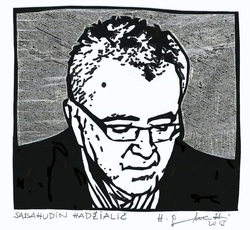
Copyright © 2014 DIOGEN pro culture magazine & Sabahudin Hadžialić
Design: Sabi / Autors & Sabahudin Hadžialić. Design LOGO - Stevo Basara.
Freelance gl. i odg. urednik od / Freelance Editor in chief as of 2009: Sabahudin Hadžialić
All Rights Reserved. Publisher online and owner: Sabahudin Hadžialić
WWW: http://sabihadzi.weebly.com
Contact Editorial board E-mail: [email protected];
Narudžbe/Order: [email protected]
Pošta/Mail: Freelance Editor in chief Sabahudin Hadžialić,
Grbavička 32, 71000 Sarajevo i/ili
Dr. Wagner 18/II, 70230 Bugojno, Bosna i Hercegovina
Design: Sabi / Autors & Sabahudin Hadžialić. Design LOGO - Stevo Basara.
Freelance gl. i odg. urednik od / Freelance Editor in chief as of 2009: Sabahudin Hadžialić
All Rights Reserved. Publisher online and owner: Sabahudin Hadžialić
WWW: http://sabihadzi.weebly.com
Contact Editorial board E-mail: [email protected];
Narudžbe/Order: [email protected]
Pošta/Mail: Freelance Editor in chief Sabahudin Hadžialić,
Grbavička 32, 71000 Sarajevo i/ili
Dr. Wagner 18/II, 70230 Bugojno, Bosna i Hercegovina



